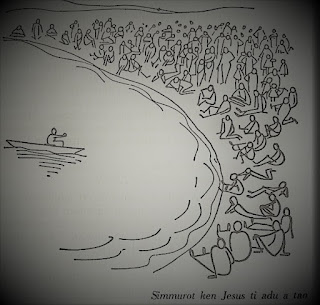What is the significance of this title that the angel gave to Joseph at the Matthean version of the annunciation (cf. Mat 1:20, part of the Gospel Reading on the Solemnity of Saint Joseph)?
There are at least three answers that one can draw from the biblical texts themselves and from what scholars are saying:
1. To Present an Earthly Jesus
The title “son of David” is significant, and for some scholars--the most significant title for Jesus in Matthew (see Kingsbury*, p. 591). The evangelist uses this title 10 times in his gospel, in contrast to Mark and Luke—4 times both, and none in John. Except in Mat 21:15 and 22:42, all of these instances in Matthew are found in Jesus’ public ministry in Galilee, especially in his ministry of healing (e.g. the healing of the Canaanite woman’s daughter, cf. Mat 15:22; and of the two blind men sitting by the roadside, cf. Mat 20:30,31).
It is also worth mentioning here that there are no instances in Matthew that the disciples called Jesus with this title or that Jesus used this title to refer to himself. Likewise, there no instances wherein Matthew employed this title to refer to the resurrection of Jesus. We can say then that the title, “son of David,” in spite of already the developing affirmation by the early Church of the divine nature Christ (ca. 80 A.D.), Matthew exerts effort to preserve the “humanity” of Jesus by using this title. One can even think here that the “son of David” could have been one of the historical titles of Jesus.
2. To Present a Jewish Jesus
Paul gave us short, rare but early information about the birth of Jesus in Gal 4:4 – “But when the fullness of time had come, God sent his Son, born of a woman, born under the law” (emphasis added NRSV). The expression, “under the law” means a Jew (see JANT, 339). For Matthew, it was important to emphasize the “Jewishness” of Jesus for three reasons:
1) Christological—to establish further the humanity of Jesus;
2) Soteriological—to preserve the continuity of God’s plan of salvation from ancient Israel reaching its peak in the story of Jesus (cf. the Genealogy);
3) Pastoral—to help the Jews who were newly converted to Christianity to deal with the question of how to be faithful Jews and at the same time faithful Christians. Matthew would have to show these via other examples, esp. the Jesus-Moses motif (note: “"Do not think that I have come to abolish the law or the prophets; I have come not to abolish but to fulfill” Mat 5:17).
But why did
Matthew prefer Jesus to be a son of David, a Judean, and not a Levite, for example?
There seems to an early Christian tradition, though not that a very influential
one, of Jesus coming from the priestly line). Even in the Matthean genealogy,
Jesus had priests in his putative ancestry (BBM, p. 40). Luke also informs us Mary
was a “relative” (Gk. syggenis) of
Elizabeth whose husband—Zechariah was a
priest (Luke 1:15). The Letter to the Hebrews also attests to that tradition.
To answer the question above, one must again consider here what R. Brown says of the pre-Matthean material—an old Christian the tradition of the annunciation of the birth of a messiah from the line of David—upon
which Matthew and Luke drew (BBM, 154-159).
Apart from the Matthean redaction then, was Jesus historically of a Davidic descent? R. Brown
devotes an ample discussion of this in Appendix II (BBM, 505-512). He
concludes with a statement that “while certainty is not possible, the NT
evidence that Jesus was really a David outweighs…doubts to the contrary”
(BBM, 511).
3. To Present Jesus as “the Son of God”
Jesus as the son of David is not an adequate title. Matthew sees Jesus as “more than the son of David” because he is the son of God (Kingsbury, 593; also BBM, 134). Already in this very first account about Jesus in the Infancy Narrative, Matthew presents such Christology. We can see this in three ways:
1) Through
Matthew’s use of the Greek “divine passive”. In Biblical Greek, a
passive voice is used when the agent of the action is God. However, there is no
explicit mention of who the agent is to avoid pronouncing the divine name.
Thus in 1:16, the passage reads: “and Jacob the father of Joseph the husband of
Mary, of whom Jesus was born, who is called the Messiah”— “of whom Jesus
was born” in Greek is ex hēs eggenēthe
Iesous—the verb eggenēthe is the passive voice of gennaō [to beget]. It
actually means, “of whom Jesus was begotten [by God]. Another example is
found in 1:20—“for the child conceived [gennēthen]
in her…” 2) By explicitly mentioning that
Mary’s conceiving is “from the Holy Spirit” (1:18,20).
3) By citing that the prophet has spoken of the child as “Emmanuel, God is
with us.
4) By informing us that child was not from Joseph as the latter made no attempt to
have relations with Mary (literally, “he kept not knowing her” in Greek, eginōsken
autēn—the tense of the verb eginōsken
is imperfect (of ginōskō). The
imperfect tense in Greek has the sense of a repeated or continued action in the
past.
Taking all these pieces of information together, one can say then that Matthew, very early on in his gospel, tries to present Jesus
not only as the "son of David"
but also as the "son of God."
In order, however, to clear the way for this Christological affirmation, there was a need first to identify Jesus as the son of David.
In OT, there existed a tradition that the king (son of David) was to be adopted by God (as a son of God). This seems to be the underlying theology (royal or Davidic theology) in 2 Sam 7:1-17, esp. v. 14.
Likewise, at the time of Jesus, there was already the idea that the future king, one who is anointed, (Heb. mashiah; Gk. christos) will come from the Davidic line and he is to be an eschatological redeemer (see JANT, 530-531, esp. the cited Psalms of Solomon dated mid-first century B.C.E.).
Thus, one can see how important for Matthew for Joseph to be the son of David.
N.B. Apart from BBM and JANT, this short article is indebted to Jack Dean Kingsbury, “The Title ‘Son of David’ in Matthew’s
Gospel,” JBL 95 (1976): 591-602.
You can access the article in our blog: www.synoptics2012.blogspot.com.
Abbreviations:
BBM = Raymond E. Brown, Birth of the Messiah
JANT = Jewish Annotated New Testament, edited by Levine and Brettler.



Comments
Post a Comment